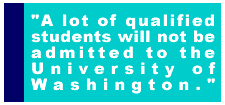 THE UNIVERSITY OF WASHINGTON ALUMNI MAGAZINE
THE UNIVERSITY OF WASHINGTON ALUMNI MAGAZINE
 THE UNIVERSITY OF WASHINGTON ALUMNI MAGAZINE
THE UNIVERSITY OF WASHINGTON ALUMNI MAGAZINE
|
Briefings'Painful' Cuts Coming After State Lowers UW Budget by $24 MillionFacing a $24.6 million loss of state revenue, the University of Washington regents voted May 17 to raise undergraduate tuition by 16 percent and impose a budget cut across academic and administrative units of about 2.5 percent. "The pain will be very, very real," President Richard L. McCormick told the Faculty Senate during an April 18 budget session. "There will be fewer classes and fewer choices. What classes we offer will be larger, and fewer will be taught by faculty. Students will take longer to graduate."  The cuts mean that 40 vacant faculty positions in the College of Arts and Sciences will not be filled, crucial maintenance of the UW's historic buildings will be put on hold, and students in future years may find it harder to get into the UW. "A lot of qualified kids will not be admitted to the University of Washington," McCormick warned. While the budget crunch applies to the 2002-03 fiscal year, UW officials fear that this is continuing a trend in weaker state support for public universities. Facing a $1.2 billion deficit, the Legislature cut higher education by 5 percent and canceled a faculty pay increase when it passed its budget in March. At the same time, lawmakers gave regents the power to set tuition for all students except resident undergraduates, imposing a 16 percent cap on any increase for that group. At its May 17 meeting, the regents approved a 16 percent increase for all undergraduates. Resident undergraduate tuition will rise from $3,593 to $4,167. Non-resident undergrad tuition will rise from $12,686 to $14,868.  The regents also approved tuition increases for some professional programs. For new resident M.B.A. students, tuition will rise 27 percent to $8,000 a year. For new resident law students, it will go up 50 percent to $9,761. Continuing students will be have lower increases. Both increases still put UW levels below tuition at peer institutions. The regents said they intend to set these programs at market rates in the next three to four years. Higher tuition will raise about $19 million, with about $1 million set aside for financial aid. With this extra financial aid revenue, UW officials feel they can meet any additional burden created by the increases. When discussing shrinking state support, McCormick and Provost Lee Huntsman are particularly troubled about faculty salary levels. While the Legislature took back a 2.6 percent increase it had budgeted earlier, lawmakers set aside $2.8 million for UW faculty recruitment and retention. However, in a move to close the budget deficit, Gov. Gary Locke vetoed these recruitment funds. "We felt that was a bad move on his part," McCormick told the faculty. The average salary gap between UW professors and those at peer institutions ranges from 9 to 11.5 percent. In addition, faculty and staff will pay, on average, an extra $60 per month for health benefits starting in January. Because of the salary freeze, the UW was forced to take deeper cuts so it could set aside $1 million for faculty promotions and $1 million for recruiting new faculty. In light of the shortfall, the UW canceled plans to upgrade its equipment and technology infrastructure and to keep pace with inflation in the libraries' acquisition budget. However, officials preserved $1 million for improvements in campus security and emergency preparedness in the wake of the Sept. 11 terrorist attacks. One of the state's goals is to fund its higher education system at the average of peer universities. Yet the state's contribution per student is $9,200, while the peer average is $11,200, notes Vice Provost for Planning and Budgeting Harlan Patterson, '81. "That's a difference of $2,000. That difference is why we are having trouble staying competitive. It's a deficit in the world in which we compete," he said. For more information on state funding of higher education, contact the Office of Government Relations, (206) 543-7604, or e-mail govrel@u.washington.edu.
|